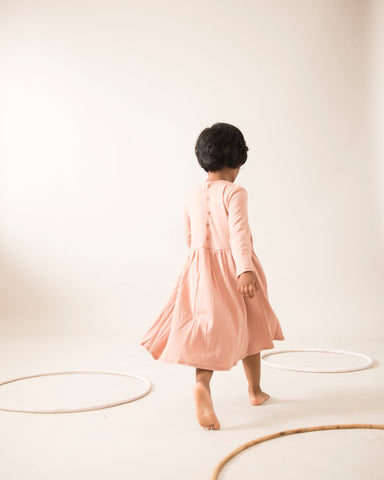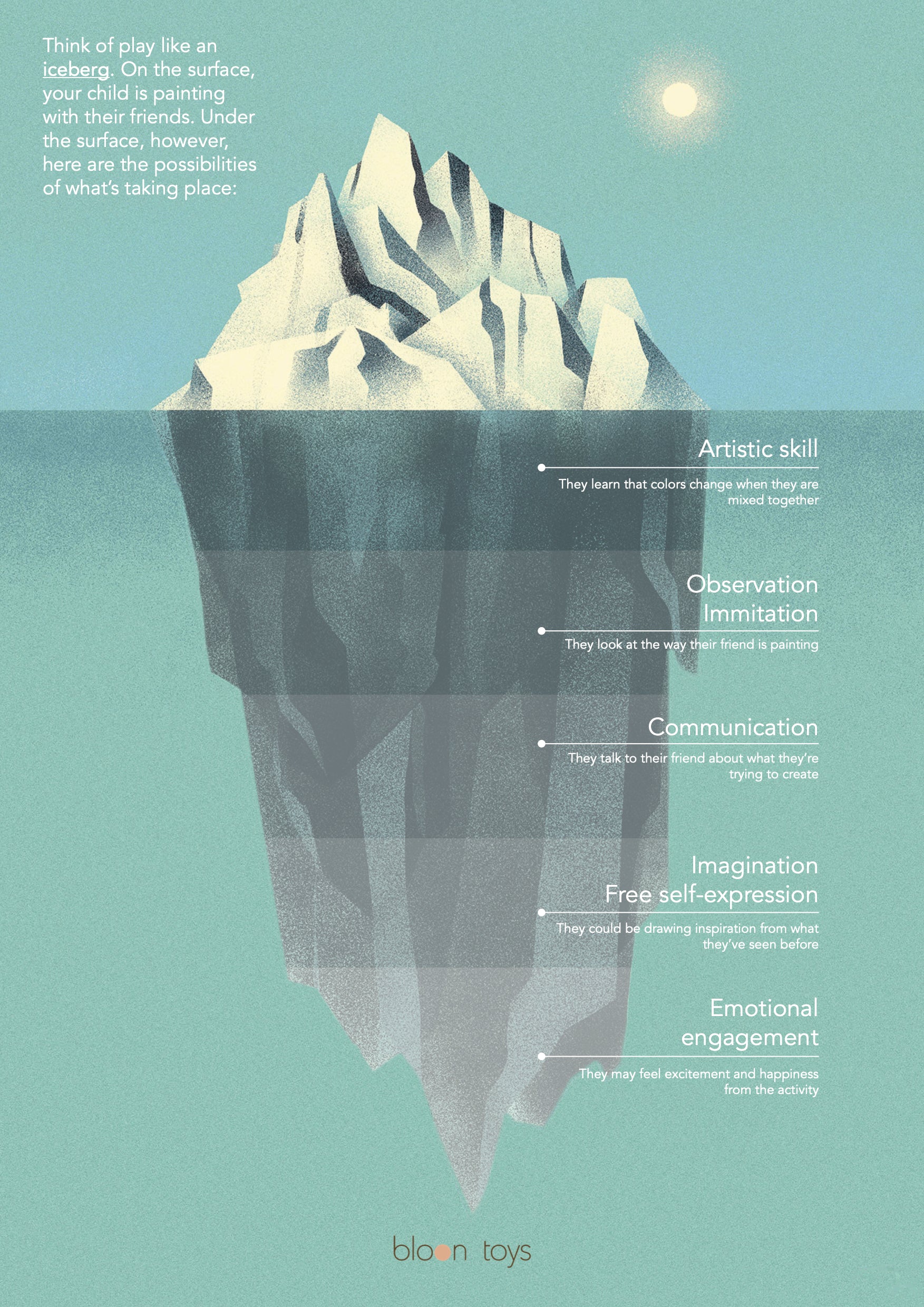As a busy parent, worrying for your child comes with the territory.
Are they eating well? Learning well? Becoming good global citizens? and so on. But here’s a new one — are they getting enough time to play?
Children playing outside has become quite a rarity ever since the lockdown, even before that. Instead, even after a whole day of learning at school, they follow a timetable with tasks lined up for them by someone else. That is a lot of structure for a child.
Play is written into a child’s most basic instincts. They were not meant to thrive under controlled rules from such a young age. Children are extremely resourceful, even a mere block of wood works to construct a rich mental world of mystique.
But why is play such a big deal?
Note: Under play, falls a very important category that we will refer to often from now on. It’s called 'free play', which is play in its purest form, without structure, solely crafted by the child with no external guidance or prior guidelines. Terms and conditions do not apply!
So then, how would you define play?
Many individuals have come up with explanations for play, with differing viewpoints as to how play works and why it exists. Peter Gray, a prominent researcher in the field of play, noticed many overlapping aspects that these definitions of play held. Here’s what he put together:
Play Is Self-Chosen and Self-Directed
Your child calls the shots here. What matters most is that play takes place as per the child’s wants and choices. They can choose to play when they want, how they want, and stop playing too!
Play is Intrinsically Motivated
It’s about the process, not about the result. Good chance you’ve seen this on social media or referred to in a self-help book, but the cool thing is, your child already practices this!
Children play because they enjoy the process, not to reach a finish line. The joy and excitement they experience during play are foremost in their minds, any other motivations come second.
Play is guided by mental rules, but the rules leave room for creativity.
While a child has free choice over play, it does not mean it is entirely without rules. Children come up with the rules themselves and can change them as they fancy.
Play is imaginative.
You’ve probably played ‘pretend’ as a child yourself, improvising for something you didn’t have during a game.
A lot of the time, play involves a mental removal from reality to a certain degree. Play is important for a child to push the boundaries of their thinking and enhance their creativity. Play-related rules can also be created with imagination. Fictional games would operate in the minds of the players.
Play is conducted in an alert, active, but relatively non-stressed frame of mind.
Considering the efforts that play demands from children, it makes sense that play needs an alert mind. Your child won't feel much stress during play, because it has no external demands. But in case your child starts to feel more stressed than what they can handle, they can stop whenever they want.
Any further attempts to continue the activity despite a high level of mental stress is no longer play.
Play is linked to learning
A lot happens behind the scenes as a child plays. Several sources have found a positive correlation between play and holistic learning as integral to a child's balanced development. Children are capable of learning through play, they don't need us as much as you may think.
Think of play like an iceberg. On the surface, your child is painting with their friends. Under the surface, however, here are the possibilities of what's taking place:
- They learn that colors change when they are mixed together. (artistic skill)
- They look at the way their friend is painting. (observing, imitation)
- They talk to their friend about what they're trying to create. (communication)
- They could be drawing inspiration from what they've seen before. (imagination, free self-expression)
- They may feel excitement and happiness from the activity. (emotional engagement)
This helps to understand the holistic impact play has on your child.
Despite science approving of play, education systems largely overlook this huge tenet of child behavior. A lack of play has effects any parent may notice in their child- restlessness, unwillingness to learn and school and often seeming discontent, to name a few.
To acquaint yourself with this underrated concept, here are some prominent theories concerning play, paraphrased:
|
Early Classical Theories
|
Contributors
|
Details
|
Your takeaway
|
|
Surplus Energy Theory
|
Schiller, Spencer
|
Play is the means chosen by children to get rid of extra energy that is not consumed in the process of self-preserving behavior, which is taken care of by the parents.
|
Play:
- helps your child use up excess energy.
- helps your child recharge from other activities.
- helps your child practice social behavior.
- helps your child absorb new ideas and new behaviors.
|
|
Relaxation Theory
|
Lazarus, Patrick
|
Play is seen as a way for the child to regain lost energy from learning behavior/cognitive activities that are still unfamiliar to them.
|
|
Pre-exercise Theory
|
Gross
|
Play helps a child to practice crucial behavior and skills that will be useful for later survival. Playful fighting between siblings, would make sense under this theory as physical and verbal skills are
exercised.
|
|
Recapitulation Theory
|
Stanley Hall, Wundt
|
Play is how the child gets rid of unnecessary, primitive behavior that
was inherited, making way for the development of the human race.
|
|
Growth Theory
|
Appleton
|
Play is the child’s response to their ‘generalized desire for growth.’
Play supports the mastery of skills that would aid the child all the
way to adulthood.
|
|
Ego-expanding Theory
|
Lange, Claparde
|
Play serves to expand and thus complete the ego of the child’s
psyche, developing their personality as well as the development of
cognitive and other additional skills.
|
|
Current Theories
|
Contributors
|
Details
|
Your takeaway
|
|
Infantile dynamics Theory
|
Lewin, Buytendijk
|
Play occurs because of the child’s ‘incomplete cognitive life space.’ The child therefore cannot discriminate between the real and unreal. Instead, the child operates in an area of ‘playful unreality’ which is changing and arbitrary. Buytendijk further adds that play is the child’s way of expressing their uncoordinated approach to the environment.
|
Play:
- helps develop personality.
- develops crucial life skills for the future.
- is your child's space to fill in the blanks of what they don’t know yet.
- develops a healthy outlet to use up energy.
|
|
Cathartic Theory
|
Freud
|
Play is the child’s attempt to partially satisfy their drives or resolve conflicts that the child lacks the means to do so. Play can temporarily resolve a child’s drive.
|
|
Psychoanalytic Theory
|
Buhler, Anna Freud
|
Play is not just a tendency to fulfill personal desire but to attain mastery as well. Play is the child’s way to cope with anxiety-inducing situations that overwhelm them, through repetition. Hence, play is defensive as well as adaptive to cope with anxiety.
|
|
Cognitive Theory
|
Piaget
|
During play, the child exercises two aspects, which allow them to integrate and process new knowledge within the limits of the motor and cognitive skills at each age. These two aspects are:
a) Accommodation:
Imitation and interaction of the child’s physical environment.
b) Assimilation: The process of integrating new information and motor skills from external sources into a limited schema*.
|
* A schema is a cognitive structure, which organizes one’s knowledge of the world and helps understand new information. They’re like ‘mental shortcuts’ to simplify things for us.
… But where is play in schools?
Play is often overlooked as an integral part of childhood in most schools, where it takes a backseat to rote learning, where progress can be quantified. However, there are alternative school systems that lay emphasis on free play alongside study. Here are two examples:
1) Montessori:
Maria Montessori believed that ‘play is the work of the child’, and that education should prepare children for all aspects of life and designed techniques that would support a child as they learned organically.
Montessori schooling is shaped around the idea that children hold a natural interest in knowledge and are capable of self-learning in a conducive environment. It also discourages conventional measures of achievement such as grades and tests.
2) Waldorf:
Based on Dr. Rudolf Steiner's concept of Anthroposophy, Waldorf schools allow children to be themselves. Its curriculum is designed based on a clear understanding of the stages in child development.
They are taught through play, doing and imitation. There is importance given to how children look at the world, through thought, feeling and physical activity.
Going outside to play was one of my greatest joys as a child. I could run circles in the sandpit, or interact with my friend’s pet goat. Maybe sneak out of my building premises to go stare at fish in a pet store.
As adults, we may not play as we did as children, but it isn't something we grow out of. Play doesn’t leave us behind. We either forget or simply are not allowed to play as much as we want because of the other grown-up things we should be doing instead.
Let them play.
P.S- There are different variations of play, and knowing how they work will ensure a better way to help your child experience the best of all worlds!
References:







Leave a comment